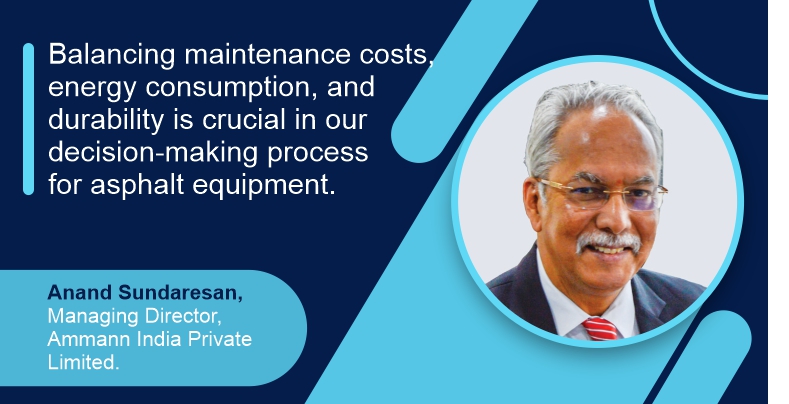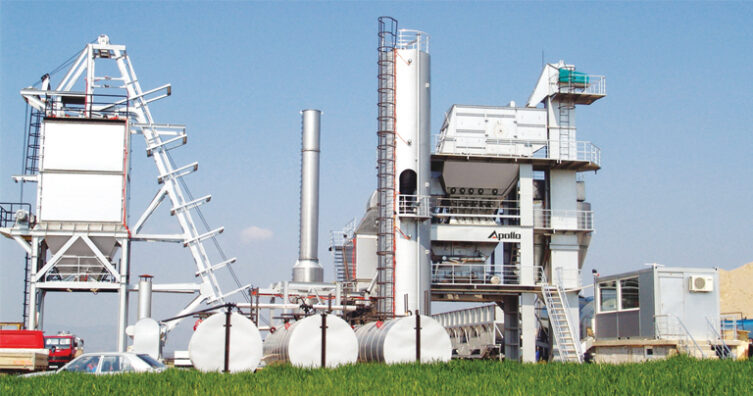AMMANN India leads the way in transforming asphalt plants with Industry 4.0
By Edit Team | September 7, 2023 12:43 pm SHARE

Balancing maintenance costs, energy consumption, and durability is crucial in our decision-making process for asphalt equipment.
Ammann India, committed to sustainability, prioritizes energy-efficient equipment, recycled materials, and digital technologies for asphalt production optimisation, says Anand Sundaresan, Managing Director of Ammann India Private Limited.
How are asphalt plant manufacturers integrating innovative technologies and processes to reduce emissions, improve energy efficiency, and enhance the overall sustainability of asphalt production?
Ammann is deeply committed to sustainability, with a strong focus on reducing its carbon footprint. This commitment is ingrained in the company’s core values, and it is evident in several key initiatives. We prioritise the use of energy-efficient equipment, incorporating advanced technologies like efficient burners, superior insulation, and optimised heating and drying methods to reduce energy consumption and emissions in asphalt production.
Furthermore. We champion the use of recycled materials, particularly recycled asphalt pavement (RAP), to decrease reliance on virgin materials. This approach lowers energy consumption and waste production, contributing to sustainability.
We embrace WMA technologies, allowing for asphalt production and laying at lower temperatures. This substantially reduces energy use and emissions during both production and construction phases. We employ advanced emission control systems that capture and mitigate pollutants from exhaust gases during asphalt production, promoting cleaner air and long-term sustainability.
Coming to innovation, our BST technology captures previously escaping vapours during loading, subjecting them to thorough filtration that eliminates oily particles and directs the remaining gas streams to the burners, further reducing emissions.
We even employ data and analytics to optimise production processes, enhancing energy efficiency and emissions reduction through real-time monitoring and analysis.
Sustainability is not just a buzzword for Ammann; it is a steadfast commitment that guides their actions every day, shaping our efforts towards a more eco-conscious and sustainable future.
Which strategies are in place to ensure a stable and uninterrupted flow of raw materials crucial for asphalt production? How do you diversify the sources to secure supply chains?
Road construction companies employ strategic approaches to ensure a consistent supply of raw materials for asphalt production. These strategies include supplier diversification to reduce reliance on one source, long-term contracts to establish stable supplier relationships, and supplier audits for risk assessment and improvement. Buffer stocks of essential materials act as temporary reserves during supply disruptions, while accurate demand forecasting minimises shortages or excess inventory.
Real-time supply chain monitoring using technology and data analytics helps detect disruptions early, and collaboration with suppliers fosters understanding and effective communication. Identifying alternative materials and local sourcing reduce lead times and transportation risks. Comprehensive risk management plans and continuous improvement efforts enhance supply chain resilience. Contingency planning for supply disruptions ensures minimal production and operational impact. These strategies collectively ensure a stable and uninterrupted flow of raw materials, supporting the success of road construction projects.
How are the asphalt equipment and plant owners leveraging digital technologies under Industry 4.0 to optimise plant operations, enhance production quality, and streamline maintenance practices?
In the asphalt equipment and plant industry, Industry 4.0 technologies have revolutionised operations, and Ammann stands out as a leader in this field with its AS1 proprietary software control systems. These systems automate production processes, ensuring precision in material ratios, temperature, and mixing times. Real-time data collection provides insights into performance, efficiency, and maintenance needs. They enable remote monitoring, boast user-friendly interfaces, offer traceability, provide predictive maintenance alerts, and allow flexibility in adjusting production parameters. These systems enhance overall plant performance and reduce environmental impact.
When evaluating asphalt equipment choices, contractors and project developers employ various methodologies for long-term economic viability and environmental impact assessment. These methodologies include Life Cycle Cost Analysis (LCCA), Total Cost of Ownership (TCO), Environmental Impact Assessment (EIA), Carbon Footprint Analysis, Sustainability Metrics, Comparative Performance Testing, Return on Investment (ROI) Analysis, Technology Benchmarking, Expert Consultation, Regulatory Compliance, and Case Studies. These approaches ensure informed decisions that strike a balance between economic feasibility and environmental sustainability in asphalt equipment selection.
What methodologies are contractors and project developers utilising to evaluate the long-term economic viability and environmental impact of different asphalt equipment choices?
Contractors and project developers employ diverse methodologies to assess the long-term economic viability and environmental impact of asphalt equipment choices. These methods guide their decisions, striking a balance between cost, performance, and sustainability:
Life Cycle Cost Analysis (LCCA): Evaluates total project costs over its lifecycle, including initial, operational, maintenance, and end-of-life expenses, aiding in comparing equipment options.
Total Cost of Ownership (TCO): Expands on LCCA, factoring in indirect costs like downtime and inefficiencies, offering a comprehensive cost perspective.
Environmental Impact Assessment (EIA): Assesses environmental effects, encompassing emissions, energy use, waste generation, and resource usage, aiding in understanding equipment’s environmental implications.
Carbon Footprint Analysis: Focuses on evaluating greenhouse gas emissions during equipment’s entire life cycle, from manufacturing to disposal.
Sustainability Metrics: Considers broader environmental, social, and economic impacts, including resource depletion, air and water quality, job creation, and community well-being.
Comparative Performance Testing: Conducts field trials to assess equipment’s real-world performance, considering factors like energy efficiency, productivity, reliability, and material wastage.
Return on Investment (ROI) Analysis: Assesses financial benefits, including increased productivity, reduced maintenance costs, and potential energy efficiency savings from equipment investments.
Technology Benchmarking: Compares equipment performance and features against industry benchmarks to identify options aligned with industry standards.
Expert Consultation: Gains insights from industry experts, consultants, and manufacturers to understand the long-term economic and environmental implications of equipment choices.
Regulatory Compliance: Considers adherence to environmental regulations, ensuring equipment aligns with current and future requirements.
By utilising these methodologies, contractors and project developers can make informed decisions that promote sustainable, cost-effective, and environmentally responsible asphalt equipment choices.

How are factors such as maintenance costs, energy consumption, and durability being integrated into decision-making processes?
When selecting asphalt equipment, decision-makers consider several critical factors to ensure both short-term project needs and long-term economic and environmental objectives are met.
Maintenance costs are a primary concern, encompassing routine upkeep, repairs, and potential downtime. Evaluating lifecycle costs, predictive maintenance capabilities, and manufacturer support aids in minimising these expenses.
Energy consumption is another vital consideration, with an emphasis on energy-efficient equipment and advanced technologies that reduce operational costs and environmental impact.
Durability hinges on material quality, maintenance practices, and warranty/service agreements. Durable and corrosion-resistant materials, easy maintenance, and longer warranties contribute to extended equipment lifespan.
Reliability is assessed through historical performance data and user feedback, guiding decision-makers towards equipment with a dependable track record.
Total Cost of Ownership (TCO) analysis offers a holistic view, combining maintenance costs, energy efficiency, and durability with initial investment and operational expenses. Scenario analysis helps identify the most cost-effective choice over the equipment’s expected lifespan.
Sustainability and environmental impact considerations include energy efficiency, emissions reduction, material efficiency, and a full lifecycle assessment. Lower energy consumption and durable equipment contribute to reduced waste and align with sustainability goals.
The decision-making process for asphalt equipment selection is multifaceted, involving a comprehensive evaluation of factors that encompass maintenance, energy efficiency, durability, reliability, total cost of ownership, and sustainability. This holistic approach ensures that equipment choices are not only efficient for immediate project needs but also sustainable and cost-effective in the long run.
Cookie Consent
We use cookies to personalize your experience. By continuing to visit this website you agree to our Terms & Conditions, Privacy Policy and Cookie Policy.




































-20240213125207.png)

























